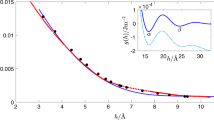Abstract
THE interesting results announced by Prof. Thomas Carnelley, of Firth College, Sheffield, in relation to the physical conditions under which ice persistently maintains its solid state when exposed to the influence of heat (NATURE, vol. xxii. p. 435), deserves some notice. When he speaks of obtaining “solid ice at temperatures so high that it was impossible to touch it without burning one's self,” it is evident that this burning quality appertains to the hot vessel containing the ice, and not to the solid ice itself. For it is obvious that under the given conditions the temperature of the surface of the ice is kept at least as low as 0° C. by the rapid vaporisation of it while in a solid state.
This is a preview of subscription content, access via your institution
Access options
Subscribe to this journal
Receive 51 print issues and online access
$199.00 per year
only $3.90 per issue
Buy this article
- Purchase on Springer Link
- Instant access to full article PDF
Prices may be subject to local taxes which are calculated during checkout
Similar content being viewed by others
Author information
Authors and Affiliations
Rights and permissions
About this article
Cite this article
LECONTE, J. “Solid Ice at High Temperatures”. Nature 22, 603–604 (1880). https://doi.org/10.1038/022603d0
Issue Date:
DOI: https://doi.org/10.1038/022603d0
Comments
By submitting a comment you agree to abide by our Terms and Community Guidelines. If you find something abusive or that does not comply with our terms or guidelines please flag it as inappropriate.



